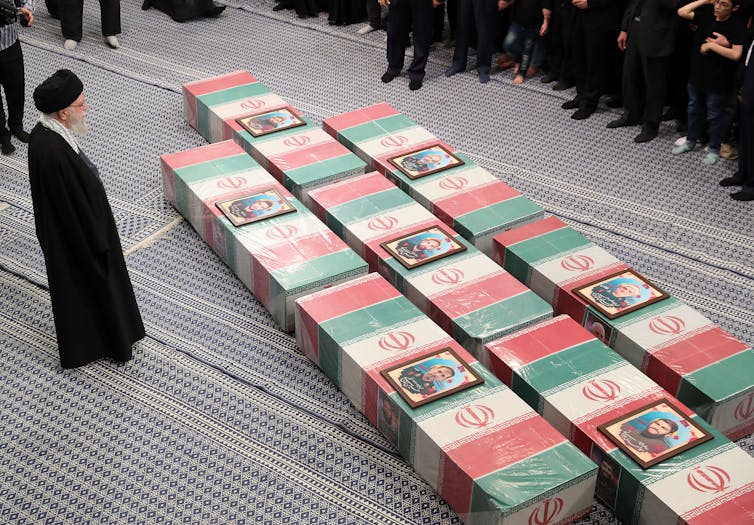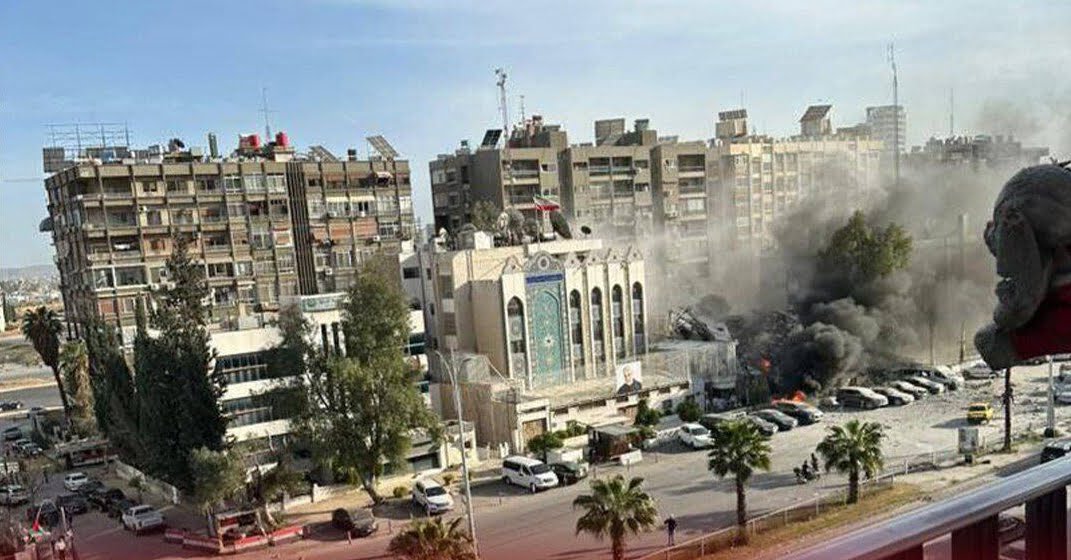By ,
It has long been held that embassies should be treated as “off-limits” to other nations. Yet in a single week, two governments – both long-established democracies – stand accused of violating, in different ways, the laws surrounding foreign diplomatic missions.
First, on April 1, 2024, Iran’s embassy in Damascus was bombed, presumably by Israel, killing several high-ranking commanders of the Quds Force of Iran’s Islamic Revolutionary Guard Corps. Then, on April 5, Ecuadorian police forced their way into the Mexican Embassy in Quito to arrest a former vice president of Ecuador who was seeking political asylum.
Both actions have led to claims of international law violations and accusations that the Vienna Convention, which establishes the immunity of diplomatic missions, was contravened.
As someone with a fair amount of knowledge of embassy life – I have served as Chile’s head of mission in China, India and South Africa and coedited The Oxford Handbook of Modern Diplomacy – I believe the two incidents are of greater concern than much of the international community appears to be viewing them.
Contrary to the famous quip from late businessman and presidential candidate Ross Perot, embassies are not just “relics of the days of sailing ships.” Rather, in an increasingly complex world where geopolitical conflict, mass migrations, pandemics and climate change require careful and stable diplomatic management, any incidents that erode the sanctity of embassy rules could have serious negative consequences. In short, they make for a more dangerous world.
Curious indifference to embassy attack
Of the two recent incidents, the Iranian embassy bombing is the more serious, as it involved the loss of life and resulted in warnings of retaliatory attacks.
Yet, Western countries, leaders of which often voice concern over upholding the so-called “rules-based order,” have been reluctant to condemn the act.

It was notable that the three liberal democracies on the U.N. Security Council – the United States, the United Kingdom and France – all refused to condemn the strike on Iran’s embassy when the issue came up before them.
Israel, while not officially acknowledging responsibility, argued that the Iranian ambassador’s residence was not really a diplomatic venue but “a military building … disguised as a civilian building.” As such, to Israel it was a perfectly legitimate target.
But by this logic, nearly all embassies would be seen as fair game.
Almost by definition, the vast majority of embassies – particularly of the larger countries – are populated with significant numbers of military and intelligence personnel. To suggest that for that reason embassies should lose their diplomatic immunity and become legitimate targets for armed attacks would bring the whole edifice of the Vienna Convention crashing down. And with it would come the structure on which worldwide formal diplomatic interactions are based.
Bedrock diplomatic principles
The case of Ecuador, though less serious because it did not involve loss of life, is a bit more complex and demands some unpacking.
At the center of the diplomatic spat between Ecuador and Mexico is former Ecuadorian Vice President Jorge Glas, who served four years behind bars following a 2017 conviction on corruption charges.
Glas is now facing trial on different charges, prompting his December 2023 application for asylum at the Mexican Embassy. Mexico accepted the request and conveyed this to the Ecuadorian government.

The latter justified its decision to send police into the Mexican embassy on the grounds that it believes Glas cannot be granted political asylum as he is a convicted felon.
There is some basis to this claim: Under the Organization of American States’ Convention on the Right to Asylum of 1954, political asylum cannot be given to convicted felons unless the charges behind such conviction are of a political nature.
But at the same time, Article 21 of the Vienna Convention states that diplomatic missions enjoy full immunity and extraterritoriality, meaning the host government does not have the right to enter an embassy without the authorization of the head of mission.
Ecuador argues that Mexico abused its diplomatic immunity, leaving it no option other than to send police in.
Yet, here a crucial distinction needs to be made.
Diplomatic immunity and the extraterritoriality of foreign missions are bedrock principles of the Vienna Convention. Political asylum is a separate matter that should be handled on its own.
As such, if the Ecuadorian government considered Glas not to qualify for political asylum, it could have attempted to legally block the move or refuse safe passage for the asylum-seeker to exit the embassy and leave the country. Mexico would have strong grounds to counter such measures, however, as according to the Convention on the Right to Asylum of 1954, it is up to the asylum-granting state to decide whether the case is politically motivated.
Implications for the future
Regardless of the merits of the asylum case, sending in the equivalent of a SWAT team to storm the embassy represents a deliberate violation of diplomatic norms.
There is a long history of Latin America politicians seeking asylum who spent many years holed up in embassy buildings because governments would not grant them safe passage – the most notable being Peruvian leader Víctor Raúl Haya de la Torre, who spent five years at the Colombian Embassy in Lima.
Yet, with a few exceptions, not even in the darkest hour of Latin America’s military dictatorships in the 1960s and 1970s were police permitted to storm into embassy buildings to arrest asylum-seekers.
And this highlights what makes Ecuador’s actions especially worrisome.
Precisely because of Latin America’s problems with political instability and a tradition of military coup, the laws surrounding political asylum and diplomatic immunity are necessary.
Undermining the Vienna Convention in the way Ecuador has risks setting a precedent that other governments might be tempted to follow.
Political asylum in Latin America has traditionally worked as a safety valve, allowing deposed leaders to get themselves out of harm’s way.
Weakening the diplomatic structures in place supporting asylum will make the handling of democratic breakdowns more difficult. It also risks exacerbating regional disagreements. We are already seeing this with Mexico breaking relations with Ecuador as a result of the embassy raid.
Making diplomacy more difficult
Of course, embassy violations are not unprecedented. Guatemala’s dictatorship attacked the Spanish Embassy in Guatemala City in 1980, killing several asylum-seekers, including a former vice president. And Uruguay’s military government sent security forces into the Venezuelan Embassy in Montevideo in 1976 to arrest a left-wing militant who had sought asylum, leading to the breakdown of diplomatic relations between the two countries.
But those events in the relatively distant past were widely and rightly condemned at the time as the product of authoritarian regimes with little regard for international conventions.
The comparatively relaxed international attitude to the embassy violations by Israel and Ecuador reflects, I believe, a failure to grasp the significance of eroding diplomatic immunity and norms.
As global challenges increase, embassies and their representatives become more important, not less so.
If the takeaway from the two latest embassy incidents is that the protection of diplomatic premises can be secondary to whatever is politically expedient on any given day, then it will be of great detriment to the management of international relations. Diplomacy will become much more difficult.
And given the enormity of the challenges the world faces today, that is the last thing any country needs.
Source: https://theconversation.com
Disclaimer: We at Prepare for Change (PFC) bring you information that is not offered by the mainstream news, and therefore may seem controversial. The opinions, views, statements, and/or information we present are not necessarily promoted, endorsed, espoused, or agreed to by Prepare for Change, its leadership Council, members, those who work with PFC, or those who read its content. However, they are hopefully provocative. Please use discernment! Use logical thinking, your own intuition and your own connection with Source, Spirit and Natural Laws to help you determine what is true and what is not. By sharing information and seeding dialogue, it is our goal to raise consciousness and awareness of higher truths to free us from enslavement of the matrix in this material realm.
 EN
EN ES
ES FR
FR PT
PT NL
NL DE
DE RU
RU SL
SL SV
SV TR
TR

























Netanyahu & its government is a psychopath nonhuman Jewish Illuminati bloodline, their only goal is to destroy humanity & human civilization,Netayahu & its master understand that Peace talk is a defeat for them they understand the next to peace talk is to surrender, they also understand Israel & Ukraine is just only a pocket of resistance fighting not to save their control and safety,they only fighting to destroy humanity as many as they can,they must be stop,
Israel should be removed from the community of nations, as Israel is illigitimate, and anti-cooperative, anti-social, anti-semetic, ….
Two related web-links:
* "Congress Introduces ADL-Backed ‘Countering Antisemitism Act’ to Police Online Speech" : https://www.renegadetribune.com/congress-introduces-adl-backed-countering-antisemitism-act-to-police-online-speech/
* "Christian [and other non-Muslim?] Students FORCED To Make Ramadan Cards In [United Kingdom] Schools" : https://www.youtube.com/watch?v=K_8uub2VH_0
(The Cuban Communist Party would deem online magazine Bitter Winter, Renegade Tribune, the Cosmotheist Church and related National Alliance, Odinia International and Expand Our Mind as having "verbal enemy propaganda")
— Elfriede Lentner, www.deviantart.com/puretassel